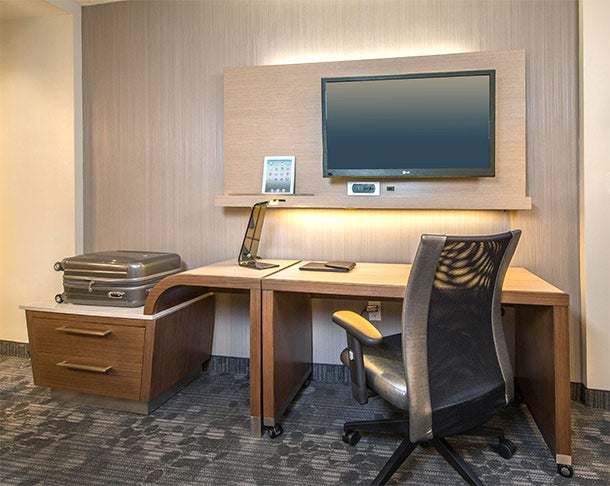What – or Who – is Driving Hotel Updates?
Opinions expressed by Entrepreneur contributors are their own.
The hotel world is, both literally and figuratively, under renovation, showcasing design changes and new launches said to be inspired by the millennial generation, generally those born between the late 1970s and 2000. Formal lobbies look more like coffee shops for laptop tappers. Contemporary art provides a gallery sense of cool. Electrical outlets abound. The front desk is disappearing. And guestrooms offer more flexible work spaces.
Carlson Rezidor Hotel Group recently announced the 2015 launch of its Radisson Red brand, featuring a mobile application that will allow guests to check-in, order food and drinks and communicate with the concierge. Citizen M, which stands for Citizen Mobility, recently opened its first North American hotel in New York’s Times Square, featuring self-service check-in and a 24-hour grab-and-go cafeteria. And Courtyard by Marriott recently tested a new guestroom design pitched to millennial business travelers; it expects to roll out 100 next-generation rooms by year end.
“Guests told us they wanted the room to focus more on relaxing and less on working,” wrote Janis Milham, senior vice president of Modern Essentials and Extended Stay for Marriott International, in an email.
The next-generation rooms now feature a deep sofa with an oversized ottoman and portable side table that offer flexible work space in addition to a standard desk. Extra outlets abound near the sofa, at the desk and beside the bed for easy portable plug-ins.
“They want clean and calm, not bold and bright,” continued Milham. “They want organic materials and patterns, not symmetrical lines and shapes. They appreciate thoughtful touches and intuitive design, but warned us not to try too hard. They want us to help enable their technology, not introduce new technology. And they want an upscale, elevated bath experience – they have it at home, and they expect it at a hotel.”
Of course, having it all (and finding an outlet) is a desire not limited to millennials. But experts argue that millennials, more numerous than Baby Boomers, have had unprecedented influence on the generations that came before them.

“Their influence on older generations in food and wine and travel and technology is greater than their purchasing power, and we haven’t seen that before,” said Jeff Fromm, co-author of Marketing To Millennials (AMACOM, 2013). “You take your fashion cues from someone younger. When you have a question on technology, you go to your 17-year-old son.”
Earlier this year, Aloft hotels began testing keyless check-in at two locations, allowing guests to use their smartphones to skip the front desk and go directly to their rooms where Bluetooth transmission unlocks doors. Marriott Hotels offers mobile check-in to users of its app at all North American hotels and several worldwide. Fifteen properties are currently testing an app-based messaging feature linking users with concierges.
“Useful is the new cool,” said Fromm. “Millennials have invented this concept. If you’re 28, you don’t want to talk to someone at the front desk unless you need them. It’s about more efficiency.”
But some experts warn marketing moves aimed at millennials both oversimplify the generation and misunderstand the travel market in general.
“We haven’t needed front desks for decades,” said Bjorn Hanson, divisional dean and clinical professor of the New York University Preston Robert Tisch Center for Hospitality, Tourism, and Sports Management, noting that the desk was originally designed as a barricade to shield cash from thieves. Now it serves a different purpose.
“Travel is stressful, confusing, and unpleasant in the minds of many consumers and when one arrives in a hotel and sees the front desk, it’s an icon of familiarity. I know what to do. I walk over, I turn over my credit card. It’s almost a little bit of a security blanket for many travelers.”
Many of the millennial launches are value-priced, appealing to a generation sensitive to cost but willing to pay a slight premium for a cooler product that reflects their social values. Think Chipotle Mexican Grill over McDonald’s, or in the travel scenario, Aloft over Holiday Inn. But travel can be an aspirational product, driving a desire to stay at higher-end hotels in the vein of Four Seasons.
“Many hotel companies are homogenizing their view of millennials and I think aiming low,” said Hanson. “There’s no generalization to apply to this complex generation other than no generalization applies.”
The hotel world is, both literally and figuratively, under renovation, showcasing design changes and new launches said to be inspired by the millennial generation, generally those born between the late 1970s and 2000. Formal lobbies look more like coffee shops for laptop tappers. Contemporary art provides a gallery sense of cool. Electrical outlets abound. The front desk is disappearing. And guestrooms offer more flexible work spaces.
Carlson Rezidor Hotel Group recently announced the 2015 launch of its Radisson Red brand, featuring a mobile application that will allow guests to check-in, order food and drinks and communicate with the concierge. Citizen M, which stands for Citizen Mobility, recently opened its first North American hotel in New York’s Times Square, featuring self-service check-in and a 24-hour grab-and-go cafeteria. And Courtyard by Marriott recently tested a new guestroom design pitched to millennial business travelers; it expects to roll out 100 next-generation rooms by year end.
“Guests told us they wanted the room to focus more on relaxing and less on working,” wrote Janis Milham, senior vice president of Modern Essentials and Extended Stay for Marriott International, in an email.





